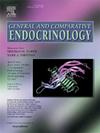Molecular characterization and stage-dependent gene expression of gonadotropin receptors in Pacific bluefin tuna, Thunnus orientalis, ovarian follicles
IF 1.7
3区 医学
Q3 ENDOCRINOLOGY & METABOLISM
引用次数: 0
Abstract
To understand the physiological mechanisms by which pituitary-derived gonadotropins (Gths), follicle-stimulating hormone (Fsh) and luteinizing hormone (Lh) regulate asynchronous oocyte development, we investigated the function and expression of Fsh and Lh receptors (Fshr and Lhr, respectively) in Pacific bluefin tuna (PBT, Thunnus orientalis). As a first, we cloned the full-length cDNAs encoding PBT Fshr and Lhr. Recombinant PBT Fsh and Lh single-chain proteins were produced in abundance using stable CHO-DG44 cell lines and were subsequently purified from the culture medium, culminating in their yields being 87.0 and 88.2%, respectively. An in vitro reporter assay using homologous recombinant Gths revealed that PBT Fshr and Lhr responded strongly to their corresponding ligands in a dose-dependent manner, with no cross-activation over a wide range of concentrations. Moreover, quantitative expression analysis of Fshr and Lhr at the follicle level showed that fshr gene expression was highly upregulated in the ovarian follicles through vitellogenesis, while lhr expression was significantly upregulated and peaked in fully vitellogenic ovarian follicles. These findings suggest that asynchronous-type oocyte development is primarily attributed to the differential function and expression of Gthrs, rather than the ligand, in PBT.
太平洋蓝鳍金枪鱼卵泡中促性腺激素受体的分子特征和阶段性基因表达。
为了了解垂体衍生的促性腺激素(Gths)、卵泡刺激素(Fsh)和黄体生成素(Lh)调控非同步卵母细胞发育的生理机制,我们研究了太平洋蓝鳍金枪鱼(PBT,Thunnus orientalis)体内Fsh和Lh受体(分别为Fshr和Lhr)的功能和表达。首先,我们克隆了编码 PBT Fshr 和 Lhr 的全长 cDNA。利用稳定的 CHO-DG44 细胞系生产出了大量重组 PBT Fsh 和 Lh 单链蛋白,随后从培养基中进行了纯化,纯化率分别为 87.0% 和 88.2%。使用同源重组 Gths 进行的体外报告分析表明,PBT Fshr 和 Lhr 对其相应配体的反应强烈,呈剂量依赖性,在很宽的浓度范围内没有交叉激活。此外,在卵泡水平对Fshr和Lhr进行的定量表达分析表明,在卵黄发生过程中,卵泡中的Fshr基因表达高度上调,而在完全卵黄发生的卵泡中,Lhr表达显著上调并达到峰值。这些发现表明,异步型卵母细胞发育主要归因于 PBT 中 Gthrs 的不同功能和表达,而不是配体。
本文章由计算机程序翻译,如有差异,请以英文原文为准。
求助全文
约1分钟内获得全文
求助全文
来源期刊

General and comparative endocrinology
医学-内分泌学与代谢
CiteScore
5.60
自引率
7.40%
发文量
120
审稿时长
2 months
期刊介绍:
General and Comparative Endocrinology publishes articles concerned with the many complexities of vertebrate and invertebrate endocrine systems at the sub-molecular, molecular, cellular and organismal levels of analysis.
 求助内容:
求助内容: 应助结果提醒方式:
应助结果提醒方式:


